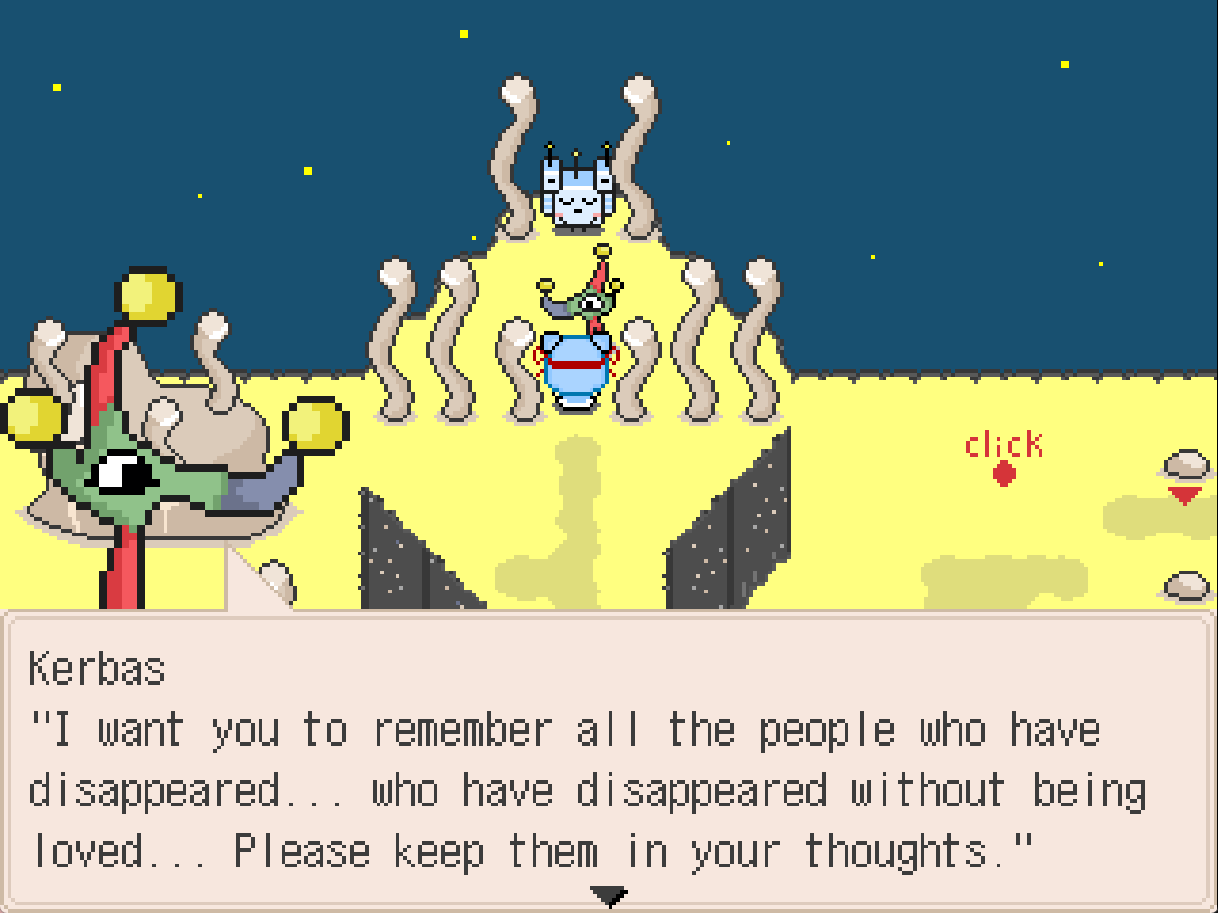haunted motherhood, and a heaven inside the heart
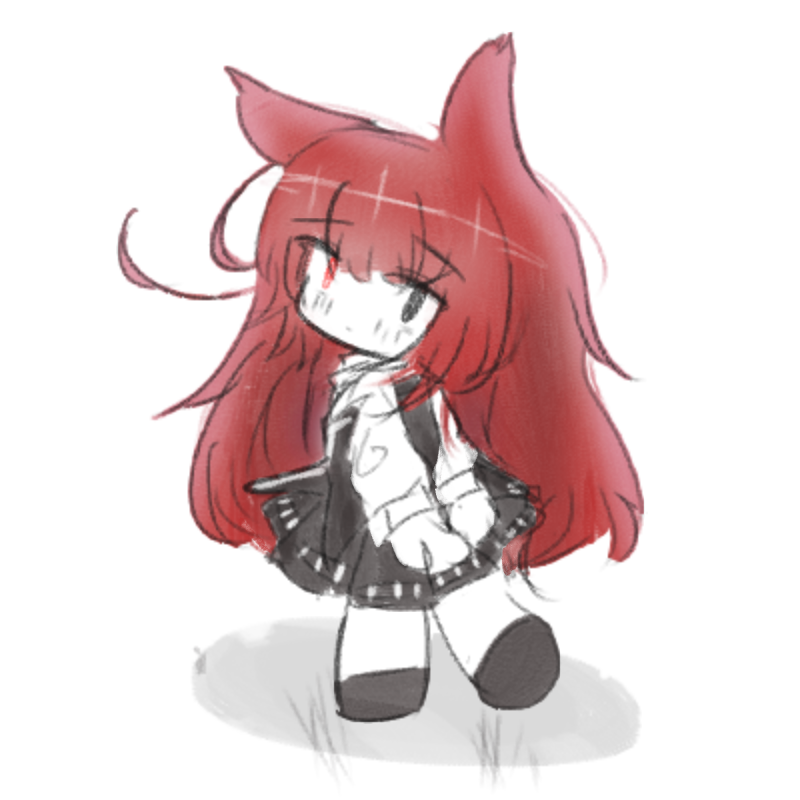
I had a discussion while I was streaming Towelket 1. I brought up 6, the next game up, only because I had read about it being so divisive. 3 had its fair share of issues, but that was mostly because it felt like it was still trying to find its footing. 6 was something different. The prevailing attitude towards this game seemed to be that of dismissiveness. Not outright ire, of course— because I'm sure that true Towelketheads (affectionate, as I self-identify as one. I love you guys) will always find something to appreciate when it comes to these games. I recall a remark along the lines of 6 marking a beginning of some sort of "Dark Age" period for Towelket. Now that I'm grossly smitten with Kanao's work, I really do value seeing other people's opinions on their work, and with that being said, this was sort of the expectation I had going into it.
I asked if this was a game that was "worth" streaming. The prevailing answer was "no," and now that I have played it I can see why. Playing it, though, I wish I did, because there would be a lot, and I mean A LOT I could talk about as I was playing. After all, I made it abundantly clear what I see in these games: I gravitated towards this series for its raunchy, edgy irreverence balanced with true displays of heart-rending perception and earnesty. Just to get it out of the way in regards to 6 now, though, this game had a lot of Nothing going on. A middle section that quite earnestly lost the plot, characters thrown in without much regard... I will admit that I probably would have worn out my throat and fallen into frustration trying to read through a lot of the character interactions and one-off comments. I have had my problems with middle sections dragging their feet in regards to the games prior to this, but this was just something else entirely.
But my woes with the act of actually playing the game are not really what I want to write about, here. Rather, I find myself so very smitten with what ideas the game has to present. Despite this game feeling quite misguided, there is still something substantial, ever present, that permeates and haunts this game. It has made this game stick to me, knowing that despite its faults, despite how misguided it is in so many ways, there is still a very strong thematic core that... surprisingly gets executed upon through and through, in my opinion. It's how the game reconciles with love and motherhood. I'd like to summarize things first, before I discuss this theme further, but if you're well aware of the plot of this game there's no harm in just skipping right ahead:
There are three girls. They're new faces amidst the familiar ones that crop up from previously, and undeniably the trio the game centers around: Minpou, Warawau, and Nyanyamo. We play as Minpou. This is interesting already as it's a departure from our silent male protagonists (not counting the option in Towelket 3, I believe this was something that was added later on down the line) of the prior games who more often than not were demoted to positions of being powerless observers to the whims of impossible forces as the plot leaves them dragging behind in silence.
Minpou's mother is prominent. It's our beloved Paripariume! But if the previous games are any indication, tragedy always befalls poor PPU. She gives birth to a baby girl at the beginning of the game.

Of course, happiness is not meant to be. Her child, Kimiru, is killed after a small scale Pon invasion, and she is left a shell of her former self. Things are not the same after this. PPU frolicks and gazes at the sky in a flower field, unintelligible and crippled... But happy. Minpou has to spend time reonciling with this, that although this is her mother, she is not the same mother she once knew. There is a constant wish in the back of her mind that things would go back to the way they used to be. Minpou has already lost her mother, here. There is so much unspoken but it speaks for so much.
The other two girls, Warawau and Nyanyamo, are not in a comfortable situation, either. They are both orphans. Despite this, however, Nyanyamo is very polite and reserved. She often thinks of others rather than herself. This a sharp contrast to her character design: deathly pale, hair emblematic of horns, wearing a gothic dress with a cross adorned upon it. I want to go out of my way and say that this contrast really drew me towards her.
Warawau, on the other hand, is more taciturn... That is, at least, when the game shows its hand in regards to her.

From what I take from this and everything Warawau -is- in this game, it goes to show something in terms of a pattern we can expect from her. Our wretched Warawau. She wears many faces. Crying Warawau. Laughing Warawau. Lacking in empathy, hedonistic, truly selfish, a manipulator. Warawau. "Devil" in character title when you pause the game. Warawau. It is not asked of you to empathize with her or admonish her, either way. These things she does just... Happen, and it moves on swiftly. There is no time to well upon these moments. Anaimal corpses litter the street, and the only one who seems to react is Nyanyamo. Warawau just becomes someone, something, a force that you come to terms with, just from how much atrocity is shown, if I can describe it this way. But things go from bad to worse. Warawau is smitten with Minpou, because she reminds Warawau of her deceased little sister. Warawau calls Minpou out to a cliff overlooking the moon, and in a warped confession of love, she knocks her out and has her way with her.
Waking up, Minpou heads home, having defied her mother's wishes not to go out at night, only to find her dead in her room. The assumption is that PPU killed herself in some grief, with Minpou missing being a reminder of her loss of her second daughter, but... In truth, something that is revealed much later on down the line... it was Warawau who went to Minpou's house and killed her. She is buried next to Kimiru atop of a hill... A very familiar hill. Now, Minpou is an orphan. Just like the others. Just like Warawau.
So this is the primary hook of the game that sets everything into motion. From here, it develops into the sort of helpless, world destroying plot that the previous three games have used. These plotlines always present a very true danger for our protagonists. It's part B-horror and part true psychological torment. It's an interesting framing device, because the stories about our characters that come from this end of the world scenario, in true sci-fi fashion, tend to be the most human of them all.
To truncate the summary and bring up important points-- along the way, as the now three orphaned girls go out to play, they stumble upon a locker which turns out to be a Pon nest of sorts. Nyanyamo is captured here, trying to make way for the other two to escape. She is forced to be the Pon Groom's bride. We then pivot to the other half of the cast: Ketsuago/Agochu and Pucchi sporting a new look. Then, we also meet the other faces were the ones I mentioned earlier who felt like they were tacked on. Cow-chan, Mitsue, two other Pucchi models. I won't be talking too much about them because even Kanao acknowledges that they are literally just there for no reason in the Reverse ending... Ugh.
Knowing the Pons are getting out of control, two of the Fish Hats (we met them in 3!!!), Zucche and Sera, develop a means to open the hearts of humanity. The two are reframed in an incredibly sympathetic manner rather than as the bumbling villains of before. The two speak of the cyclical nature of the universe, how, as long as the two of them keep their hearts, that they will meet again no matter what the case may be. Sera is referred to as a mother by their escort, Nekoashi Konbu, one of the "D-series" to a ship: the MacGuffin of the game. These D-series are pieces which our protagonists have to seek out to open their hearts once more, and in doing so, the path to defeat the Pons should open to them.
These three pieces correspond to three of the characters. Agochu, Minpou, and Warawau. And all of these pieces of their hearts that have been locked away all have to do with their mothers.
For Agochu, she comes to terms with loss. She lost her mother when she was young. To reconcile this memory of her, she put more of her life towards robotics, and created a robot that looks just like her mother: Pucchi. And although these first Pucchi models wore her mother's face, they could not speak in anything but barks and howls. They were not her mother. That frustration is what compounded into the closed off individual that she had become. But after opening her heart, she realizes that a piece of her mother, everything that she stands for, was right in front of her all along... Pucchi. Although this is of course undercut in true Towelket fashion as Agochu immediately grows an Oedipus complex and starts groping at Pucchi every character interaction, but that's neither here nor there, wau ♥♥♥
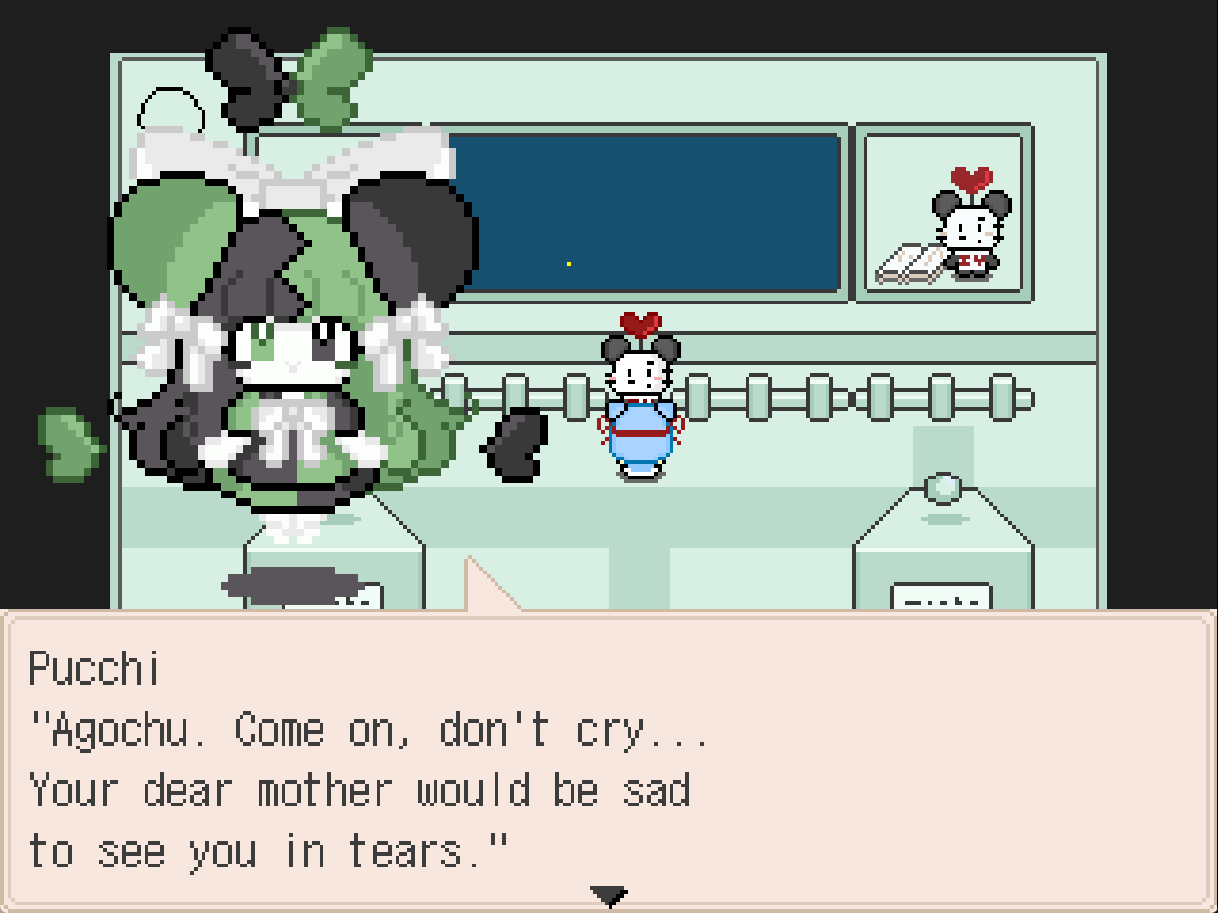
Minpou, to reclaim her heart, needs to make someone else feel loved. In particular, there is an isolated town, with its only resident being a lone girl on a hospital bed: a blind girl, Mary, who dreams of having a friend. Minpou accomodates her requests, and it is revealed in a shared dream that Mary was another D-series piece. She opens her eyes and looks upon a beautiful field of flowers, the purple flowers that Minpou would often leave at her mother's grave. Mary, seeing something so beautiful for the first time in her life, imparts herself upon Minpou. She reunites with her mother in this dreamscape realm, and is elated with joy. Perhaps this stands for what Minpou was lacking in— she has the ability to love others, but never the capacity to truly show it. Perhaps this is what she has had to live with after Paripariume died, this guilt of not being able to share this love with her before losing her. It is fitting, thus, that Minpou... Starts speaking. Breaking the pattern of silent protagonists. She is still a bit of a yes-girl so to speak, but it is palpable hearing her tell Warawau that she really likes both her and Nyanyamo as friends.
Last is Warawau... and her memories of a "mother" are not as pleasant. What was flower fields for Minpou is a rainy, dreary night for her. She reclaims these memories in a graveyard, through a door where cows go to heaven. In this... Cow heaven, so to speak, they claim the memories from the Cow Queen. It is here we find that Warawau's mother actually passed away not long after her little sister. The implication is that her father was the cause of this. And in grieving, to "replace" Warawau's mother, her father started viewing Warawau as a "mother" and all that would entail. Warawau doesn't reclaim anything in particular for this. Rather, it just acts as a form of validation to how she has lashed out towards the world up until this point. Ill intent, selfishness, violence, what else has the world given to her up until this point?
Suffice to say, though, after all this, the plot pushes forwards towards a conclusion. The cast is seperated, and there is a brief tenure of philisophical musing, but in earnest it feels misplaced. I'm sorry Nekojita, but at this point, I don't think Warawau is the type person you want to be musing to about human connection, even if your allegory holds the weight of the world behind it... So, I'd just like to move ahead to significant reveals as these are much more relevant:
Warawau is the first to stumble upon the Pon mothership. She finds a room full of baby Pons. The room beyond is Nyanyamo's room, an empty pink room with only a carpet and a single window looking out into endless space. She has become a shell of her former self, a reflection of PPU in some manner. After being captured, she was made into a mother against her will. I feel like her being the one being captured and the one the Pons had an eye on is a given. After all, her traits were very similar to PPU's. Calm, reserved, so very caring... Even in spite of all this, after speaking of her pain and devolving into a fit of laughter, she is killed by Warawau, who only replies with a little giggle, and an "is that so?"
Minpou is second to arrive, and she stumbles upon Nyanyamo's room. Nyanyamo's corpse is in the corner, having been killed by Warawau, and Minpou finally sees Warawau for who she truly is. She slaps her. This is not something that Minpou can accept. And it's here where Warawau shows her true self and kills Minpou, "her property."
And then... A cliffhanger ending. Maybe it would be more apt to say it is a nothing ending. Agochu's crew finds the scene of Warawau's story so to speak coming to a conclusion, and the four of them warp as far as they can away. A "to be continued" in Towelket 4. And as far as I know from what I have played so far, this plot does not resolve or continue whatsoever in Towelket 4...
I omitted quite a bit, but this is the gist of the plot and in earnest the rest is mostly inconsequential in the grand scheme of things. It should be evidently clear that there is something that ties a lot of these characters together, and that is their relationship with a mother, or motherhood. This is something that looms over all of them, haunts them, and it's something that affects how they all interact with another and the world around them. I could not help but read the game under this lens. It's easy to place these on a spectrum of sorts.
The purest form and display of this would be Sera's. Although her situation is far from ideal, her interactions bled a true filial love, manifesting in the D-series, her figurative children, whose entire purpose was to open the heart of the other characters who are typified by their relationship with the mother figure. This love is something that is wholly worth propagating to others, to remind them all. She, along with Zucche, despite everything, are at peace in these final moments. Knowing that there is a love with the weight of the fate on the world inside of their hearts. I wish that this segment had a bit more time to breathe in terms of lead up, but what was shown spoke so much.
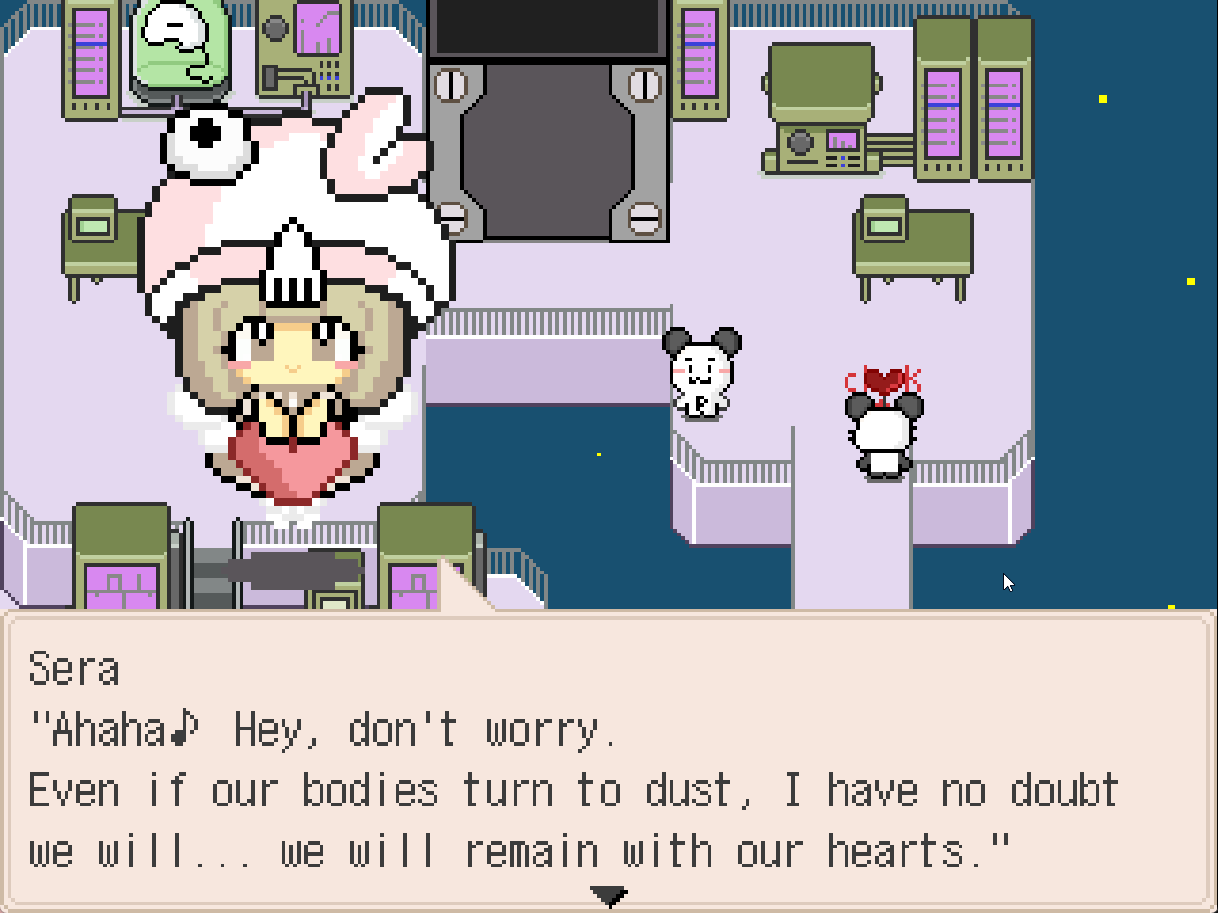
Agochu and Minpou lie on the regenerative side of things. It makes sense why the memories these two had were locked up and needed to be dredged out— to lose one's own mother, given the circumstance the two of them were in, must have been nothing short of traumatic. And yet, despite everything and all the pain, there was still love present in their relationships with their mothers. This was something that the two of them forgot. They needed a reminder. Agochu closed herself off, treated Pucchi like dirt, but upon remembering everything, she was like a new person entirely. Kind again, albeit kind of freaky.

Paripariume, despite everything, was still Minpou's mother, through and through. It was taken completely for granted. Even after losing herself, there was prevailing mention of PPU still harboring concern for her first daughter. I would not doubt it at all if, it wasn't for Warawau's meddling, that PPU would despair if Minpou went missing. That would be all she had left, and then it would be gone. Minpou reclaiming her ability to "speak" after coming to terms with this stands for how she has rid herself of this passive complacency, which ties into her being a different sort of protagonist compared to the boys of the prior games. It is just a shame that this didn't come to play as much as I would have liked it to. Despite that, though, there is a clear regenerative element presented here. And the two who reclaimed the mother's love in their heart are the ones set to save the world. But then there is the other side of the coin.
Nyanyamo has already reconciled with the loss of her mother, but perhaps that is why it takes so much out of her when she sees that the same thing that has happened to her happens to Minpou. She is the first to admonish Minpou for leaving her alone, but when Minpou rushes in to see her mother, she tries her best to comfort her nevertheless. She checks on Minpou at her mother's grave. She tries to pick flowers to bring to PPU and Kimiru. She can recognize when her friends are struggling. She is the one who says that what is most important is that these feelings come from the heart.
The heart. As long as there is heart, there is that space for compassion, for love. Heaven for the departed is within the heart. She is so kind. She is so unconditionally kind, and it is characters like this in Kanao's work thus far who get broken and hurt the most. Her heart gets broken in the worst way possible. It is so sick, so ironic, that it is done by her becoming a "mother," and it's so... so fucked up how a room full of little mascot creatures can elicit this dread and illness in the pit of my heart. Nyanyamo, at the end of the game, laughs. She can only laugh. She laughs, because she lost her heart. And this reflects someone else. The character who I read as the true "main character" of this game, and why I was thinking so deeply about all this shit, possibly reading too much into it all, so to speak.
Warawau. Crying Warawau. Laughing Warawau. A girl without love, whose view on it has been warped beyond repair. She thinks sex and violence is love, "motherhood," because that's what she was subject to. So she imparts this love upon the world. Left without any heart whatsoever. She struggles to understand others. She doesn't understand why Minpou cries, why she smiles, she doesn't understand why Nyanyamo picks flowers for the departed. Where is the meaning in this? She viewed PPU as an obstacle standing between her and Minpou, and the same for Nyanyamo. She killed the both of them. And when Minpou herself stood her ground, that too, was an obstacle towards love. So she kills her, too.
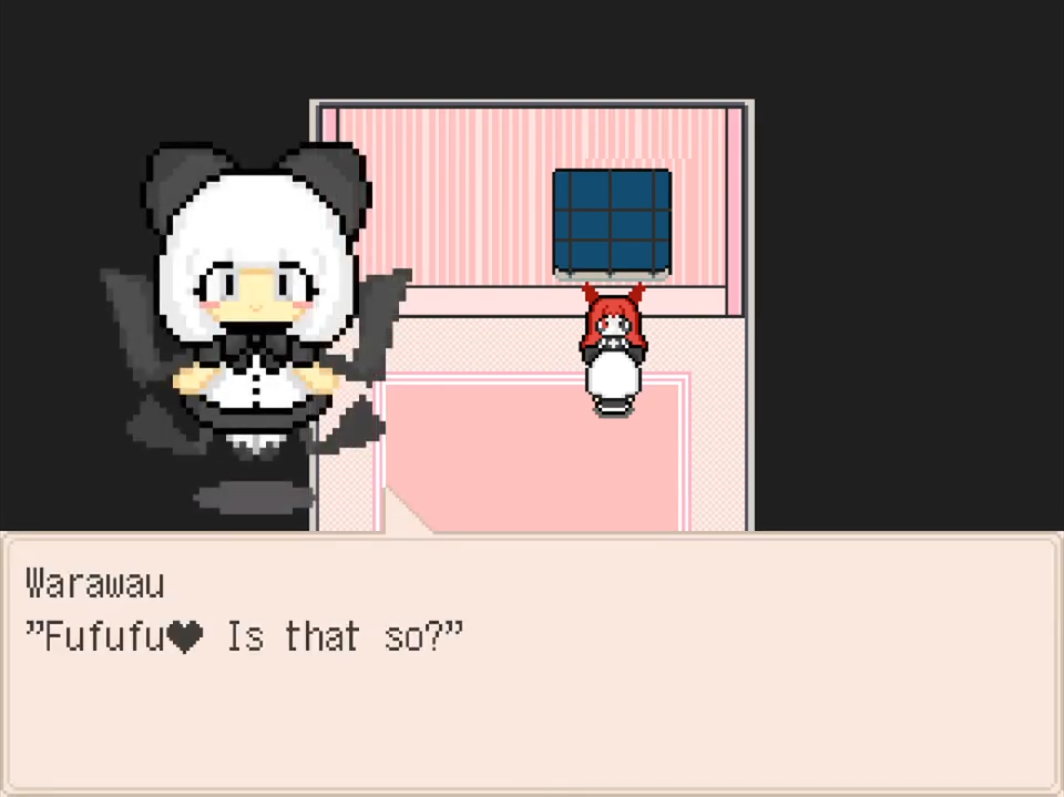
In the final moments of the game, before killing her, when Warawau sees Nyanyamo broken, she giggles. Rather, more than that, she acknowledges her. Throughout the game, we are told that they are friends, but she treats Nyanyamo with animosity at best, and vitriol at worst, and this, only after all this, is the only time where Nyanyamo is acknowledged by her. She still sacrificed herself for Warawau, even after being mistreated and told that she was the one at fault for Paripariume's death, but Warawau didn't even bat an eye. But now...? Maybe it's an impossible stretch, because it's only just one line, but maybe it is only here where Warawau feels a tinge of something towards Nyanyamo. It's impossible to discern what is behind this line, but I feel like it's love. Whether this love came out of pity, out of seeing a bit of herself in Nyanyamo, who was also forced into the position of a "mother," it's hard to say, but I cannot help but read this when all of the game and all of Warawau's story added up to this.
It's hard to make out what the intent with all this is, because Towelket 6 is so woefully lopsided in terms of where it takes itself, not to mention it ending... just like that. But there is something to take from it. I think that this game still had something to say and that the journey through it was wholly worth it. Warawau serves as a warning. Nekojita spoke in length to her, echoing the notion from Minpou, from Nyanyamo, who have reconcilled themselves that, so long as there is a space, a heaven inside one's heart to love another, that one will be at peace. If there is no space for that, though... Then there will only be room to destroy. To destroy everything around you.
